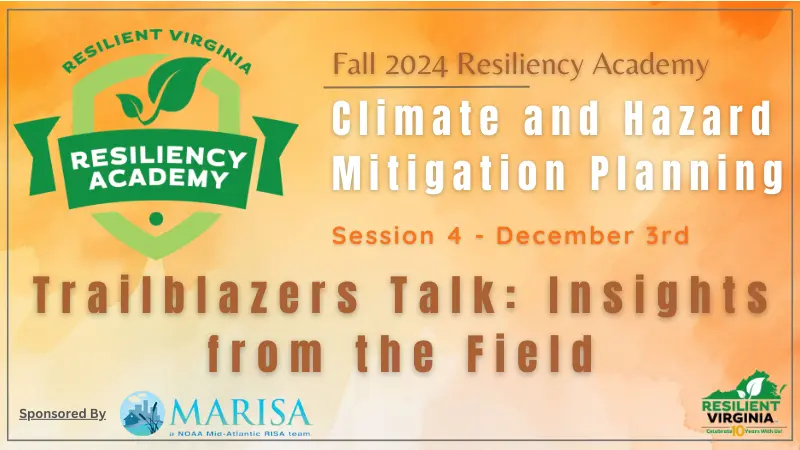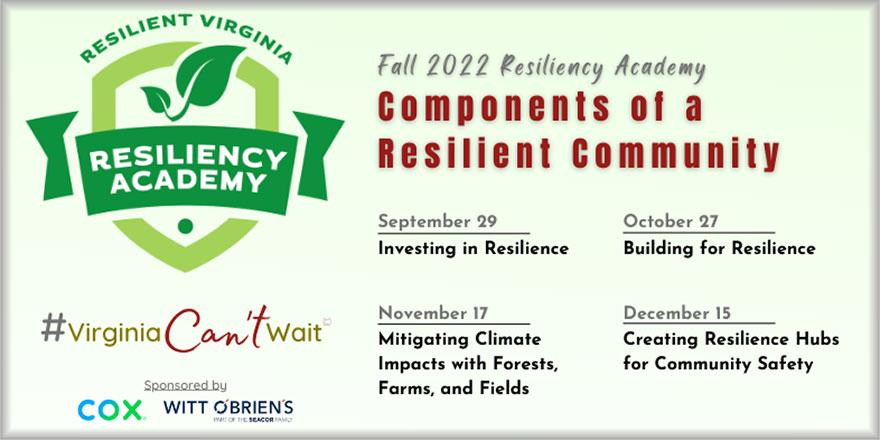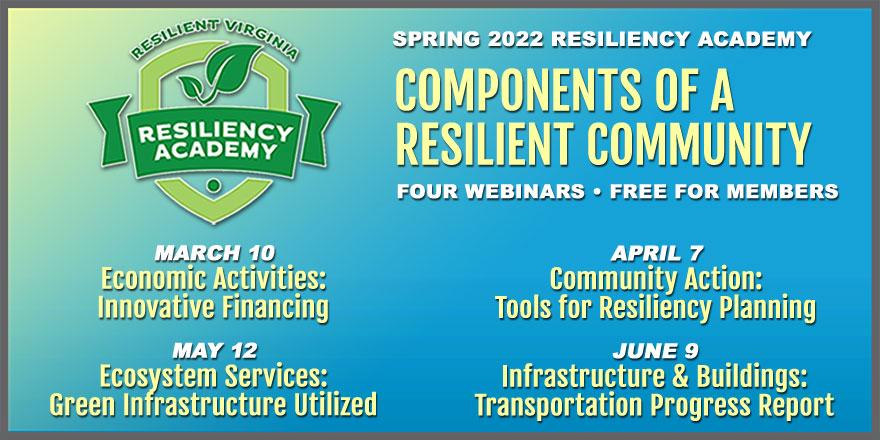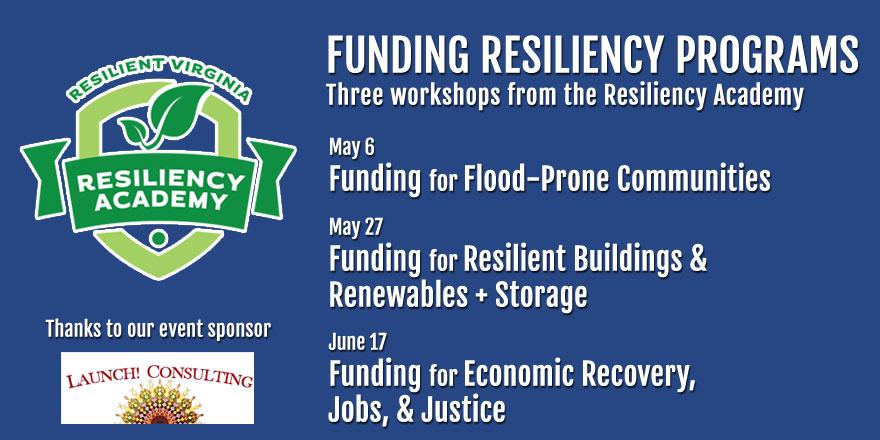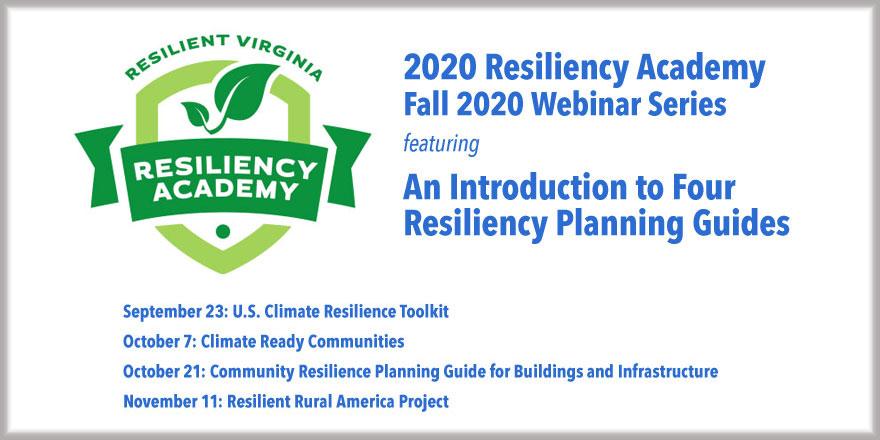Resilient Virginia’s Resiliency Academy series was established in 2020 and continues to deliver timely and relevant resiliency topics via webinars. Past topics include resiliency planning “how-to’s” for local governments; disaster mitigation funding; economic impact and opportunities; resilient building and infrastructure design; and the role of ecosystems in community resilience.
Members have access to our entire video library of Academies, along with presentations and video from our past Conferences. Click here for a full list of membership benefits.
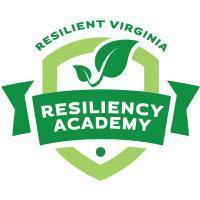
Fall 2024 Resiliency Academy Session 4
Trailblazers Talk:
Insights from the Field
We completed our 2024 Resiliency Academy with a round-table conversation on local and regional governments’ experience in including climate in their Hazard Mitigation Plan updates and how they are implementing resilience mitigation actions in their locality.
View recordings and browse webinar resources below.
Speakers
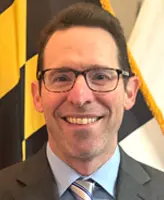
David Mandell
Deputy Director
City of Annapolis Office of Emergency Management
Dave Mandell has served as the Deputy Director of the City of Annapolis Office of Emergency Management since 2014. He graduated from Washington University in St. Louis and also received a Juris Doctor degree from the University of Maryland School of Law. He earned the Certified Emergency Manager designation in 2019. Dave is responsible for all emergency management program areas, including response, planning, grants management, training and education, and public outreach. He manages the City of Annapolis Hazard Mitigation Plan, which was updated most recently in 2023 under the new FEMA guidance. Dave has a passion for bringing major mitigation projects to fruition. He has coordinated efforts that have secured about $9.7 million in mitigation grant funds for Annapolis.
The 2024 Resiliency Academy is offered free of charge
thanks to funding from MARISA.

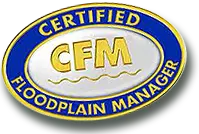
Attention APA Planners
The September 5 session of the Resiliency Academy has been approved by the Virginia Chapter of the APA for 1 CM. Use Code 9295780.
Attention Certified Floodplain Managers
Each 2024 Resiliency Academy session has been approved by ASFM for 1 CEC. If you attend any of the sessions, please let us know and we will send you a proof of attendance to submit for your credit.
Previous Fall 2024 Academy Events
The Latest on Climate in the Mid-Atlantic
September 5, 2024
The Fall 2024 Resiliency Academy kicked off with a look at current and projected climate risks for the Mid-Atlantic region.
As our climate is changing, we are experiencing more extreme events, such as heat waves and storms, which are impacting the way our communities need to plan. The first session of the Fall Resiliency Academy discussed climate risks for the Mid-Atlantic region, including a high-level overall view of risks and a closer look at risks from extreme precipitation and heat. We also take a look at how extreme events are impacting the coast.
Watch the webinar or view the Event Slideshow.
Speaker Resources
Fifth National Climate Assessment – Southeast Chapter
Fifth National Climate Assessment – Northeast Chapter
Fifth National Climate Assessment – Climate Trends
Climate and Hazard Mitigation Planning (CHaMP) Tool
Virginia Coastal Resilience Master Plan
Future Sea Level and Recurrent Flooding Risk for Coastal Virginia
Billion-Dollar Weather and Climate Disasters
Resilience Analysis and Planning Tool (RAPT)
Climate Mapping for Resilience and Adaptation (CMRA)

Jeremy Hoffman
Director of Climate Justice and Impact
Groundwork US
<!--Jeremy S. Hoffman, Ph.D., is the Director of Climate Justice and Impact at Groundwork USA and an affiliate faculty in the L. Douglas Wilder School of Governmental and Public Affairs at Virginia Commonwealth University and the Department of Geography, Environment, and Sustainability at the University of Richmond. Jeremy is an award-winning environmental educator and nationally recognized climate science communicator. He is the Lead Author for the Southeast Chapter of the Fifth National Climate Assessment, NCA5.-->
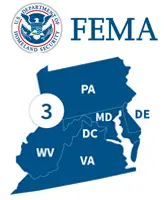
Rodney Bahner
Community Planner
FEMA Region 3
<!--Rodney Bahner is a Community Planner with FEMA Region 3, assisting Virginia communities with hazard mitigation planning and project implementation through the Virginia FEMA Integration Team (FIT). Prior to joining FEMA, he worked in local land-use planning and historic preservation planning, most recently as the City Planner for Morgantown, West Virginia. Rodney received master’s degrees in Community and Regional Planning and Historic Preservation from the University of Oregon. Outside of the office, he’s served on nonprofit boards committed to advancing historic preservation and increasing parks access.-->

Art DeGaetano
Professor of Earth and Atmospheric Sciences
Cornell University
<!--Art DeGaetano received an interdisciplinary Ph.D. focusing on Climatology and Horticulture from Rutgers University in 1989. He was an assistant professor in the Department of Meteorology at the South Dakota School of Mines and Technology in Rapid City, South Dakota until 2001. Art began his career at Cornell in 2001 as a research climatologist in the federally supported Northeast Regional Climate Center (NRCC) on Cornell's main campus. He is currently a professor in the Department of Earth and Atmospheric Sciences and Director of the NRCC. The mission of the NRCC is to enhance the use and dissemination of climate information to a wide variety of sectors in the Northeast. Art serves as an editor for the American Meteorological Society Journal of Applied Meteorology and Climatology.-->

Jessica Whitehead
Institute for Coastal Adaptation and Resilience
Old Dominion University
<!--Dr. Jessica Whitehead is the Joan P. Brock Endowed Executive Director of the Institute for Coastal Adaptation and Resilience (ICAR) at Old Dominion University. A nationally recognized expert in climate adaptation and using climate information for resilience policy, Dr. Whitehead served the U.S. Global Change Research Program as the chapter lead author for the Northeast Chapter of the Fifth U.S. National Climate Assessment, released in November 2023. Within the Commonwealth, she is a member of the Virginia Coastal Resilience Technical Advisory Committee. Previously, Dr. Whitehead was the first state Chief Resilience Officer for North Carolina, based in the NC Office of Recovery and Resiliency, and the first coastal climate extension specialist with NC Sea Grant, the South Carolina Sea Grant Consortium, and the Carolinas Integrated Sciences and Assessments (CISA) Program. She earned her Doctor of Philosophy in geography and Master of Science in meteorology from The Pennsylvania State University and a Bachelor of Science in physics with a concentration in meteorology from the College of Charleston. Her work helping coastal communities in the Carolinas adapt to climate change has been featured in podcasts, books, newspapers, television, and public radio, including The Washington Post, The New York Times, and The Weather Channel.-->
FEMA Regulations: Requirements and Benefits
October 8, 2024
Session 2 of our Fall Resliency Academy explores how to integrate climate in your planning efforts and the benefits it will bring.
Knowing what climate changes our communities are likely to experience and integrating them into their planning efforts can help localities properly plan for the future. But that’s not the only benefit of integrating climate into planning efforts. It also opens up funding opportunities that can help communities implement actions to achieve their resilience goals.
Watch the webinar or view the Event Slideshow.
Speaker Resources
Building Resilient Infrastructure and Communities (BRIC)
Flood Mitigation Assistance (FMA) Grant Program
Hazard Mitigation Grant Program (HMGP)
Rehabilitation of High Hazard Potential Dams (HHPD)
Fire Management Assistance Grants (FMAG)
Local Mitigation Planning Policy Guide
Local Mitigation Planning Handbook
Climate Adaptation Planning: Guidance for Emergency Managers
Resilience Analysis and Planning Tool (RAPT)
Climate Risk + Resilience Portal (ClimRR)
Climate Mapping for Resilience and Adaptation (CMRA)
FEMA Resources for Climate Resilience
Building Alliances for Climate Action
Long-Term Community Resilience Exercise Resource Guide
FEMA Region 3: Local Hazard Mitigation Planning Resources
Fifth National Climate Assessment
Guidelines for Considering Traditional Knowledge in Climate Change Initiatives
Equity and Mitigation Planning
Climate and Economic Justice Screening Tool
Promoting Nature-Based Hazard Mitigation Through FEMA Mitigation Grants
US EPA Disaster Resilient Design Concepts
HUD Climate Resilience Implementation Guide: Nature-based Solutions
National Centers for Environmental Information
U.S. Climate Resilience Toolkit
Equitable Adaptation Legal & Policy Toolkit
Managing the Retreat from Rising Seas: Lessons and Tools from 17 Case Studies
Climate Change and Displacement in U.S. Communities
Climate Change in Coastal Communities
Sign up for FEMA Region 3 Email Updates

Jeramie Calandro
Emergency Management Specialist
FEMA
<!--Ms. Calandro is an Emergency Management Specialist within The Federal Emergency Management Agency (FEMA), Office of Resilience Strategy. She supports a team of professionals who apply research, policy, and data skills to develop guidance and resources to enhance the nation's resilience efforts. Ms. Calandro has over a decade of experience in emergency management, with a background in local and regional emergency planning and grant management, social services, and policy. She holds a Master’s from Georgetown University and spends her free time with her family.-->

Rodney Bahner
Community Planner
FEMA Region 3
<!--Rodney Bahner is a Community Planner with FEMA Region 3, assisting Virginia communities with hazard mitigation planning and project implementation through the Virginia FEMA Integration Team (FIT). Prior to joining FEMA, he worked in local land-use planning and historic preservation planning, most recently as the City Planner for Morgantown, West Virginia. Rodney received master’s degrees in Community and Regional Planning and Historic Preservation from the University of Oregon. Outside of the office, he’s served on nonprofit boards committed to advancing historic preservation and increasing parks access.-->

Katie Vugdalic
State Hazard Mitigation Officer
Virginia DEQ
Hazard Mitigation Tools: Saving Lives, Building Resilience
November 12, 2024
Our November 12 event focused on where to find data for Hazard Mitigation Plans and how you can include social vulnerability in your planning process.
Watch the webinar or view the Event Slideshow.

Baja
Originator of the Resilience Hub Concept
Developer, New and Improved All Hazard Mitigation Plan
<!-- Baja (she/ki) is an energy rooted in empathy, love, and compassion. She coaches, facilitates, and leads workshops, retreats, and trainings that nurture heart-centered self- and collective-liberation while supporting deeper connectivity to nature’s genius and shifting of power. Baja is the originator of the Resilience Hub concept and has been working on Resilience Hubs for over a decade throughout North America and Internationally. She also developed the New and Improved All Hazard Mitigation Plan which integrates social, ecological and climate elements into Hazard Mitigation Planning and Process. Baja most recently served as the Senior Director of Direct Support and Innovation with USDN and was also the Climate Resilience Planner and Floodplain Manager with the City of Baltimore. She holds a Masters of Urban Planning and a Masters of Science from the University of Michigan and a Masters in Biomimicry from ASU. In 2016, she was recognized by the Obama Administration as a Champion of Change for her work on climate and equity.-->

Melissa Finucane
Vice President of Science & Innovation
Union of Concerned Scientists
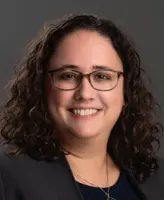
Krista Romita Grocholski
Physical Scientist, RAND Corporation
Lead Principal Investigator, Mid-Atlantic Climate Adaptation Program (MARISA)
Trailblazers Talk: Insights from the Field
December 3, 2024
We wrap up this year-long series with a round-table conversation on local and regional governments’ experience in including climate in their Hazard Mitigation Plan updates and how they are implementing resilience mitigation actions in their locality.
We have a great panel of speakers who share their experiences with hazard mitigation planning and resilience implementation efforts.
Watch the webinar or view the Event Slideshow.

David Mandell
Deputy Director
City of Annapolis Office of Emergency Management
<!--Dave Mandell has served as the Deputy Director of the City of Annapolis Office of Emergency Management since 2014. He graduated from Washington University in St. Louis and also received a Juris Doctor degree from the University of Maryland School of Law. He earned the Certified Emergency Manager designation in 2019. Dave is responsible for all emergency management program areas, including response, planning, grants management, training and education, and public outreach. He manages the City of Annapolis Hazard Mitigation Plan, which was updated most recently in 2023 under the new FEMA guidance. Dave has a passion for bringing major mitigation projects to fruition. He has coordinated efforts that have secured about $9.7 million in mitigation grant funds for Annapolis.-->

Sarah Stewart
REME Planning Director
PlanRVA
<!--Sarah joined PlanRVA in 2007 and works as the REME (Resiliency, Emergency Management, Environment) Planning Director for the Environmental Program. Her responsibilities include managing environmental and resiliency grants and projects related to watershed policy coordination, Chesapeake Bay TMDL planning, regional environmental committee coordination, hazard mitigation planning and litter prevention. Her favorite part of being a planning manager is getting to work on such a wide variety of projects with people all across the state.
Born and raised in the Richmond region, Sarah's favorite spots to visit include the VMFA and the James River. She enjoys exploring and participating in outdoor activities like kayaking, hiking, and biking. Sarah also loves to have fun with her husband, two children, and Irish terrier.
Sarah received her master’s degree in Urban and Regional planning from Virginia Commonwealth University..-->

Jenn Clarke
Program and Operations Supervisor
City of Richmond's Stormwater Utility
<!--Jenn is a spirited (if not slightly overzealous) board and card game player, an amateur but avid knitter, and a Program and Operations Supervisor with the City of Richmond’s Stormwater Utility and their integrated RVAH2O Clean Water Initiative.
With diverse experience at the intersection of human and environmental wellness, Jenn is passionate about building relationships, partnerships, community, and infrastructure in an effort to effect positive hands-on change to improve the health of the James River and how life is enjoyed along it.
Jenn originally hails from Washington State, where she received her BA in Environmental Studies at the University of Washington.-->

Matt Lewis
Operations Support Coordinator
Botetourt County Department of Community Development
<!--Matthew is the Operations Support Coordinator for the Department of Community Development in Botetourt County, Virginia. His time in Botetourt began in November of 2022 as the Code Enforcement Officer for the Planning & Zoning Department. He has been a part of Botetourt’s new solar ordinance, is facilitating a software migration for the department, and is active with multiple grant opportunities.
Matthew is a life-long Salem, Virginia resident with an Associate’s degree in Information Systems Technology from Virginia Western Community College. He continues his educational goals through various certifications in the fields of building inspections, zoning, and planning. He intends to work towards his certified floodplain manager certification. He enjoys spending time with his 6-year-old daughter and his wife Katrina.-->

Lindsey Adams
Climate Resiliency Engineer
Weston & Sampson
<!--Lindsey is a Climate Resiliency Engineer with Weston & Sampson, specializing in integrating climate adaptation strategies into the planning and design of communities along the east coast. Lindsey develops resilient strategies that bring forth technical engineering solutions and sustainable design principles tailored to each specific community. Her work prioritizes equity and community engagement to help communities prepare for and mitigate environmental challenges.
Lindsey has a background in Civil Engineering and Environmental Conservation and Sustainability from the University of New Hampshire. Native to New England, she now resides in Georgia. Lindsey spends much of her free time outside hiking and mountain biking.-->

Erin Herock
Resilience Planner
Weston & Sampson
<!--Erin is a Richmond-based resilience planner at Weston & Sampson where she specializes in climate adaptation planning, flood management solutions, and plan writing. She has professional working and educational experience in sustainability, policy analysis, community engagement, GIS, graphic design, and resiliency-based analysis and strategies. She received a Master of Urban and Environmental Planning from the School of Architecture at University of Virginia.-->
Spring 2024 Academy Events
Understanding Climate in Virginia
March 26, 2024
Get acquainted with future climate projections for Virginia in the first session of the Spring 2024 Resiliency Academy. Jeremy Hoffman, Director of Climate Justice and Impact at Groundwork USA and lead author of the Southeast Chapter of the 5th National Climate Assessment, presents a summary of the most recent projections for this region and additional speakers discuss how the changing climate will impact their communities.
Attendees will leave with a better understanding of how communities across Virginia are going to be impacted by climate change and what they will need to consider in their planning efforts.
Watch the webinar or view the Event Slideshow.

Jeremy Hoffman
Director of Climate Justice and Impact
Groundwork US

Jessica Whitehead
Institute for Coastal Adaptation and Resilience
Old Dominion University

Brent Wills
Wills Soil & Stream
Montvale, Virginia
Integrating Climate in Hazard Mitigation Planning
May 2, 2024
Hear from Virginia Department of Emergency Management (VDEM) and Federal Emergency Management Agency (FEMA) on the new requirements for Hazard Mitigation Plans and available resources. In addition, you’ll hear directly from some who have already updated Hazard Mitigation Plans according to the new guidelines.
Gain a better understanding of what is now required when updating Hazard Mitigation Plans and what resources are available.
Watch the webinar or view the Event Slideshow.

Rodney Bahner
Community Planner
FEMA Region 3

Dave Mandell
Deputy Director
City of Annapolis Office of Emergency Management

Debbie Messmer
Deputy Director of Grant Management and Recovery
Virginia Department of Emergency Management

Anna Kimelblatt, CFM,
Project Planner and Certified Floodplain Manager
Weston & Sampson Engineers

Janet Moonan, PE
Senior Project Manager
Weston & Sampson Engineers
Tools for Climate and Hazard Mitigation Planning
May 26, 2024
In this session we discuss tools from MARISA, DCR, FEMA, and USDN for Climate and Hazard Mitigation Planning.
It’s essential to gather the right data for your region when planning for climate risk and hazard mitigation.
Fortunately, there are tools available to help with this task. We have a great line-up of speakers for this session who cover a variety of tools that can be used in your planning efforts.
Learn more about:
- DCR’s Coastal Resilience Web Explorer;
- MARISA’s suite of data and tools;
- FEMA’s Resilience Analysis and Planning Tool (RAPT), National Risk Index, and HAZUS; and
- USDN’s Hazard Mitigation Planning Guidance document.
Watch the webinar or view the Event Slideshow.

Matt Dalon
Program Manager, Office of Resilience Planning
Virginia Department of Conservation and Recreation

Baja
Originator of the Resilience Hub Concept
Developer, New and Improved All Hazard Mitigation Plan
<!--Baja (she/ki) is an energy rooted in empathy, love, and compassion. She coaches, facilitates, and leads workshops, retreats, and trainings that nurture heart-centered self- and collective-liberation while supporting deeper connectivity to nature’s genius and shifting of power. Baja is the originator of the Resilience Hub concept and has been working on Resilience Hubs for over a decade throughout North America and Internationally. She also developed the New and Improved All Hazard Mitigation Plan which integrates social, ecological and climate elements into Hazard Mitigation Planning and Process. Baja most recently served as the Senior Director of Direct Support and Innovation with USDN and was also the Climate Resilience Planner and Floodplain Manager with the City of Baltimore. She holds a Masters of Urban Planning and a Masters of Science from the University of Michigan and a Masters in Biomimicry from ASU. In 2016, she was recognized by the Obama Administration as a Champion of Change for her work on climate and equity. -->

Bill Bohn
Acting Chair of Resilient Virginia
Chief Executive Officer, Community Resilience Consulting, LLC
<!--Bill Bohn is Acting Chair of Resilient Virginia and the Chief Executive Officer for Community Resilience Consulting, LLC a small business headquartered in Lynchburg, Virginia. For the last 20 years, he has supported communities and projects around the world with hazard and climate change risk assessments, including hazard mitigation and climate adaptation plans in the U.S. He has supported USAID, World Bank, IFC, and IDB conducting climate change risk assessments and adaptation plans in Africa, Asia, Caribbean, Middle East, North America, and South America.
He supported the development of the Community Resilience Course for the National Disaster Preparedness Training Center, the Coastal Climate Change Adaptation Course for NOAA’s Coastal Services Center, and was an author of the World Bank’s Community Reconstruction Handbook. He also helped develop and facilitate a one-day Flood Resilience Workshop for EPA’s Smart Growth Program. He currently supports FEMA headquarters with testing, developing training materials and technical manuals, and teaching their risk assessment software, Hazus. Mr. Bohn has an undergraduate degree from Virginia Tech in Aerospace and Ocean Engineering and graduate degree in Geographic and Cartographic Sciences. He lives with his wife and three kids (and two goats and several chickens) in Lynchburg, Virginia.-->

Krista Romita Grocholski
Physical Scientist, RAND Corporation
Lead Principal Investigator, Mid-Atlantic Climate Adaptation Program (MARISA)
Using CHaMP for Local Hazard Mitigation Planning
June 18, 2024
In this session we take a deep dive into using the Climate and Hazard Mitigation Planning tool (CHaMP) for Local Hazard Mitigation Planning.
The first three Spring 2024 Resiliency Academy sessions have taken a look at climate projections for Virginia, how we can integrate these projections into our climate and hazard mitigation plans, and some tools that can help us do this. This final session will provide a closer look at one of the tools — the Climate and Hazard Mitigation Planning tool (CHaMP), developed by the NOAA-funded Mid-Atlantic Climate Adaptation (formerly RISA) program.
Watch the webinar or view the Event Slideshow and discover how you can use CHaMP to help with your Hazard Mitigation Planning.

Krista Romita Grocholski
Physical Scientist, RAND Corporation
Lead Principal Investigator, Mid-Atlantic Climate Adaptation Program (MARISA)
<!--Dr. Romita Grocholski is a physical scientist at the RAND Corporation, a professor of policy analysis at the Pardee RAND Graduate School and serves as the lead principal investigator for the NOAA-funded Mid-Atlantic Climate Adaptation (formerly RISA) program (MARISA). Her work on climate adaptation and resilience includes developing decision- and user-centered climate data tools and incorporating climate projections into stormwater management and hazard mitigation planning processes. Dr. Romita Grocholski is committed to co-development of these climate tools, iteratively updating their content to address users’ real-world needs and suggestions.
Prior to joining RAND, she completed her Ph.D. in observational astronomy at the University of Florida. Romita Grocholski received her M.S. in astronomy from the University of Florida and her B.A. in astronomy and physics from Vassar College.-->

Lena Easton-Calabria
Program Manager
MARISA
<!--Lena Easton-Calabria is a Policy Analyst and Program Manager for the NOAA Mid-Atlantic Regional Integrated Sciences and Assessments (MARISA) Center. Her interdisciplinary expertise and interests lie primarily in the fields of climate adaptation, geography, and anthropology. Since joining RAND in 2020, Easton-Calabria's work has covered multiple topics including disaster management, climate change, environmental health, and environmental justice.
Prior to joining RAND, Easton-Calabria worked for The Nature Conservancy (TNC) in Washington, DC, where she pioneered research to identify priority green stormwater infrastructure locations and created TNC's first Community Designed Greenspace program. Easton-Calabria was previously a National Geographic Emerging Explorer and led research on climate change and globalization impacts in remote Indigenous communities of the Amazon rainforest for three years.
Lena Easton-Calabria holds a Master of Science in Environmental Change and Management from the University of Oxford, and a bachelor’s degree in Medical Anthropology and Global Health from the University of Washington. She is currently pursuing a PhD in Geography and the Environment from the University of Oxford's Environmental Change Institute.-->

